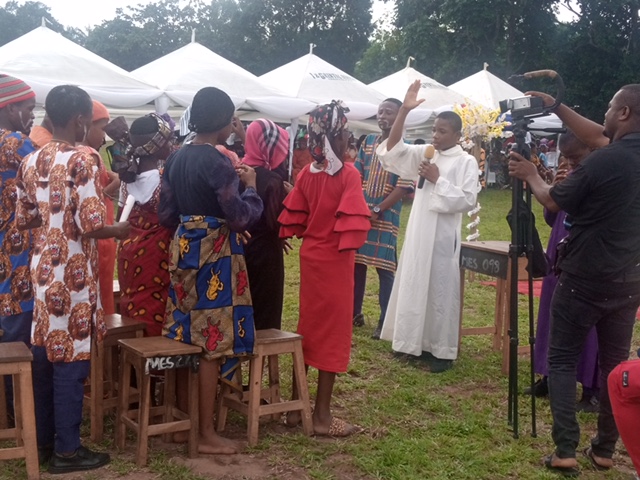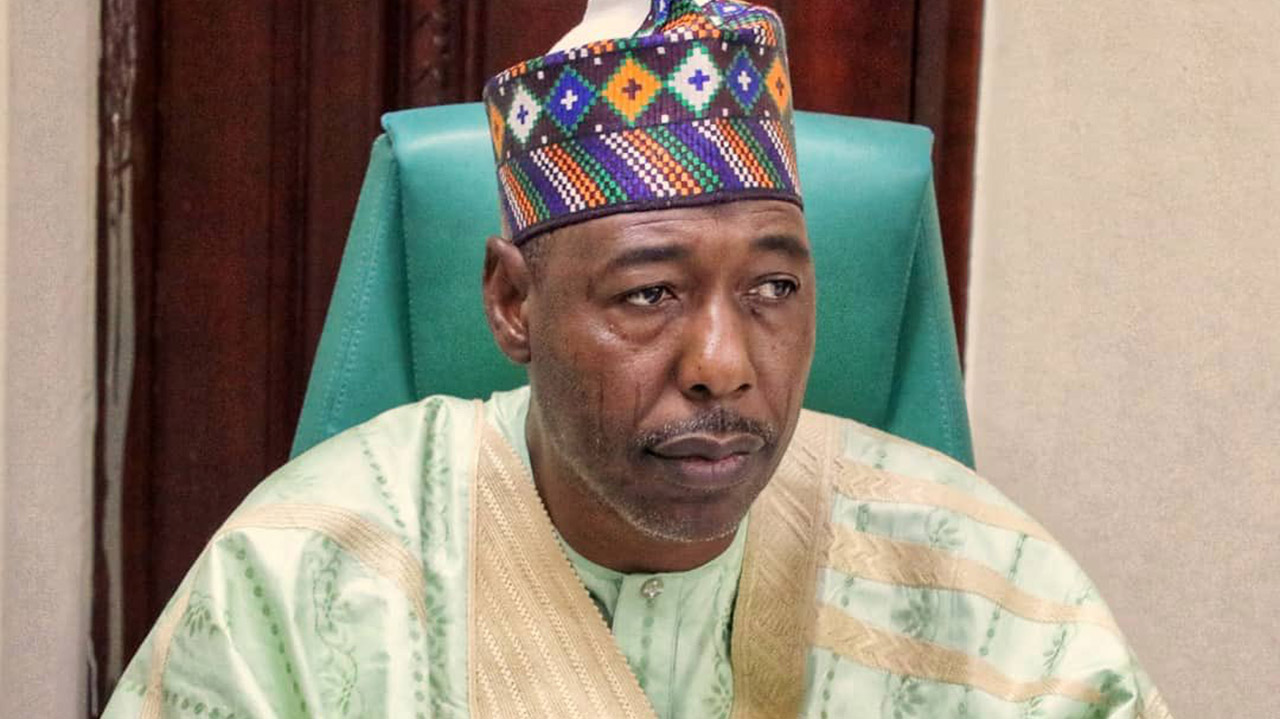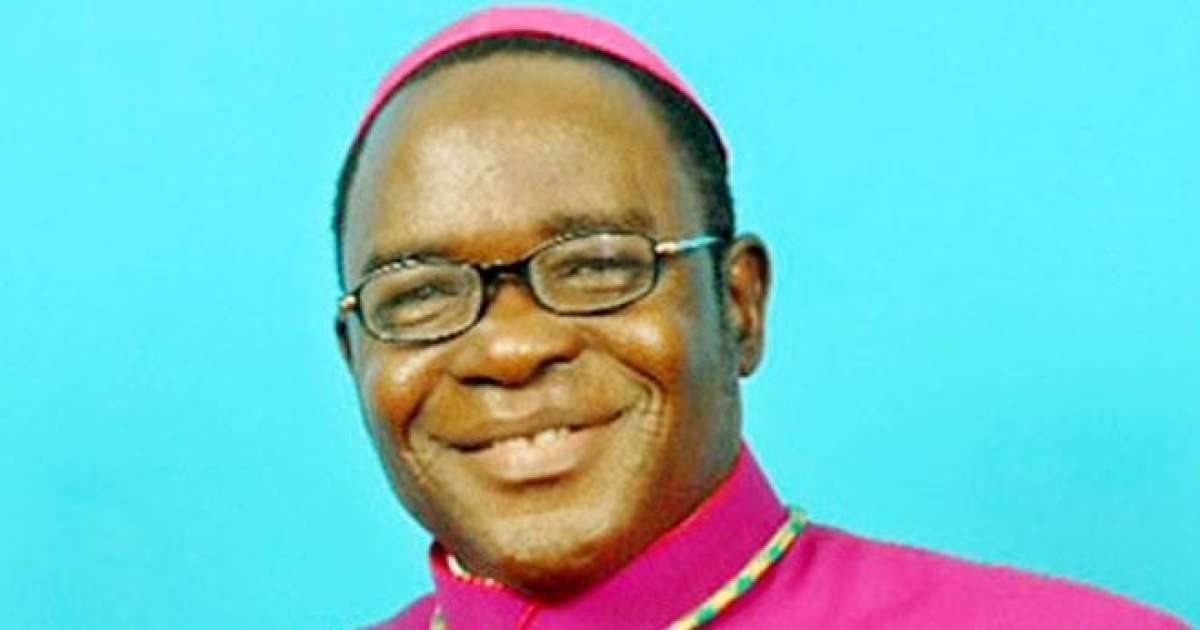Dapsy: father of modern investigative journalism in Nigeria
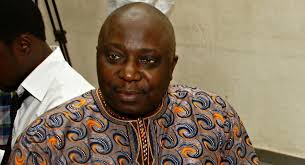
Title: Testimony to Courage: Essays in Honour of Dapo Olorunyomi
Editors: Chido Onumah and Frederick Adetiba
Publishers: Kappa and Omega Company, Abuja
Pages: 404
Reviewer: Theophilus Abbah, PhD
It has been sluggish strides, like baby-steps. That is the journey of newspapering in Nigeria from being a church bulletin, established in 1859 by Reverend Henry Townsend, to a platform for public accountability. Sauntering through populist and anti-colonial landscape, and relaxing in the post-colonial era, where it served as an instrument for propaganda and mouthpieces of government, Journalism in Nigeria has taken decades to realise its true essence in the socio-political life of the country. This self-realization have come through catalysts whose resilience and unquenchable thirst for the ideal have pressed through a maze of resistance and compromise to give birth to critical and enterprise journalism that have blossomed in the last decade. This is the subject-matter of Testimony to Courage: Essays in Honour of Dapo Olorunyomi.
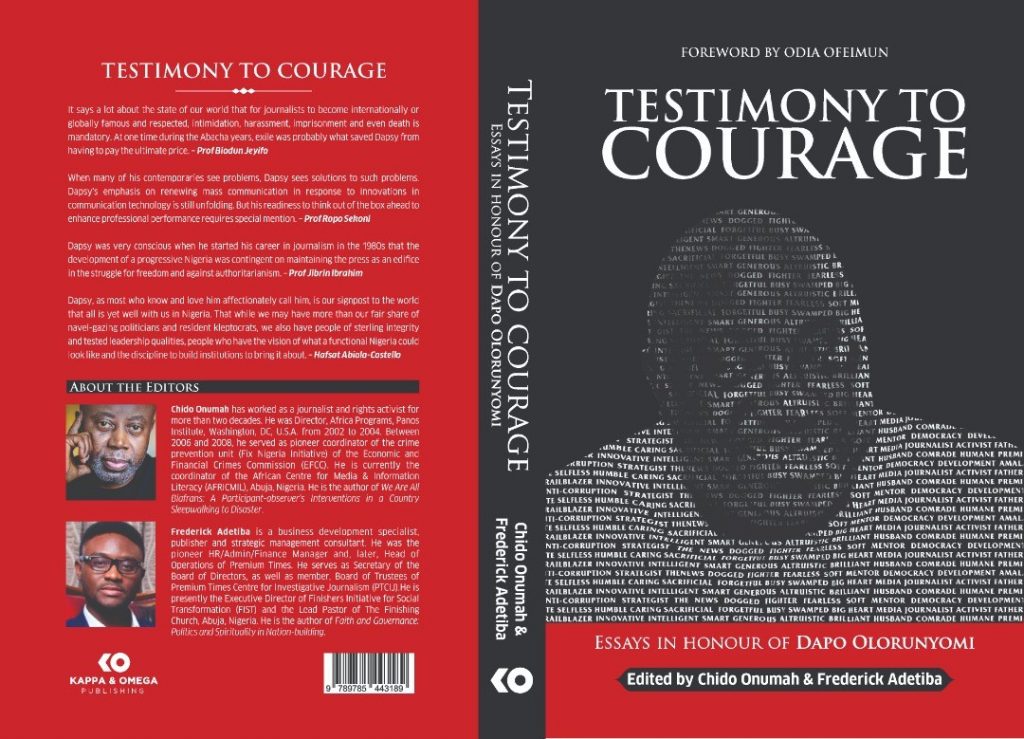
Cover of Testimony to Courage
This 404-page book is an assemblage of over a hundred thousand words who struggle to capture the story of Dapo Olorunyomi, born in 1957 and better known by his signature alias – Dapsy. A recurring name in modern investigative journalism, Dapo has left his footprint at almost every exciting publication in the country – Concord, The News, Tempo, Next, and now Premium Times. His uncompromising and principled approach to reporting led to predictable predicaments – death threats and life in exile- in the dark and unholy dispensation of khaki rule in Nigeria. Testimony to Courage is, therefore, a unique story-telling approach, a harvest of experiences and thoughts of outstanding Nigerian writers, activities, journalists, politicians and publishers of Dapsy and his positive influences on journalism in the country.
Odia Ofeimun, a wordsmith, who contributed the enchanting “Forward” to the book, aptly captures the elegant diversity in the work thus: “Some of the essays offer testimonies that account for the sources of the ideas and idealism, something of a natural history of the ideological and activist moments that made the man the phenomenon that he has become. Olorunyomi’s journalistic activism is presented as a byword of deep-rooted political orientations that have helped to sustain a sense of independency and creativity. From the days when political activism was regarded as a detraction from accepted journalistic standards, to current accommodation of a modulated deviation from old forms and standards, the picture that emerges is of a zeal for corrective agendas, as part of the resistance to anti-democratic forces.”
From Dapo’s sibling Sola Olorunyomi’s brilliant piece, accommodated in the book as prologue, Dapo has always been a dreamer, uncommon and different, ironic, ‘generous-to-a-fault, and dan iska, not only as a journalist but also from the homestead, where his schemes and pranks rose beyond stereotypes and conservatism. The three other segments of the book, Journalistic Exploits, Activism and Democratic Struggles, and Legacy: Investing in the Future, presents the book as a brilliant biography written by multiple authors, an assemblage of family members, Dapo’s university teachers, contemporaries in and outside the country, and mentees in the newsroom. This way, there in an unequivocal recollection of events, experiences, plots and dialogues, beyond the measure that Dapo’s own memory has stored and could recollect, if he were writing his own story in an autobiography. Here lies the strength of this Testimony to Courage.
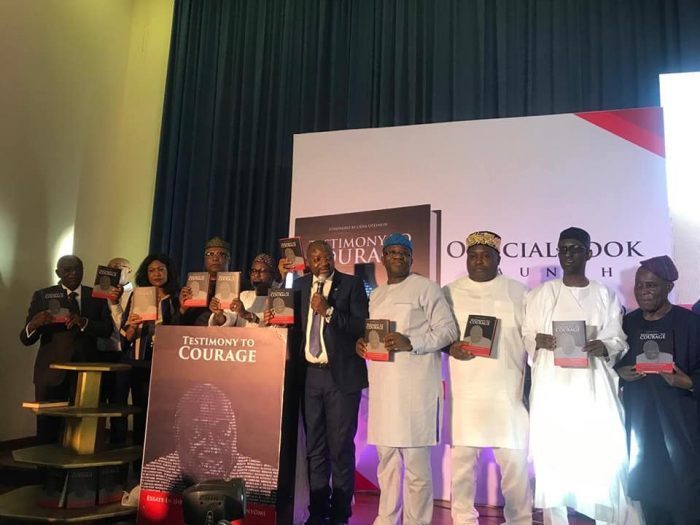
Dignitaries at the launch of Testimony to Courage
For instance, Professor Ropo Sekoni, who taught Dapo at Obafemi Awolowo University [formerly University of Ife] describes him as “a risk-taker,” who could not create a dividing line between social activism and his academic endeavours. But activism did not ruin his academic pursuit, and vice versa. Instead, according to Professor Sekoni, one watered and caused the other to blossom, as Dapo’s “voracious reading of progressive literature across disciplines,” enriched his academic output to the point that his lecturers could not ignore the colour of excellence such readings added to what Dapo had been taught. This way, he escaped from the mould of ‘back-to-sender’ students, who derived satisfaction their recollection of their lecturers’ notes and examples, instead of venturing into other research works in their fields to enrich their learning experience. Professor Biodun Jeyifo, formerly at Cornell University, USA, who also taught Dapo at OAU, in his own contributions to the book, buttressed the thesis by Professor Repo. Jeyifo, came up with a hypothesis that if Dapo had not enlisted in journalism, he would have excelled in academic, because, as an undergraduate, he had developed uncommon curiosity for philosophers and philosophical thoughts from Europe; thoughts that border on liberal democracy, the bedrock of modern Western civilization.
Perhaps, there are few personalities in the country who can attract such a huge crowd of testifiers, either by professional colleagues, family members or business associates, like you find in this book on Dapo Olorunyomi. Professor Umar Pate, one of the leading lights in Mass Communications studies in Nigeria today, describes Dapo as “a mentor that I hugely respect and admire for many reasons.” Senior Advocate of Nigeria Femi Falana calls him “ a role model,” while Dr Kole Shettima, Director of MacArthur Foundation (Africa) says “Premium Times [established by Dapo Olorunyomi] has changed the investigative journalism landscape in Nigeria and is making strides in Africa and globally.” Frontline politician and All Progressives Congress (APC) National Leader, Asiwaju Bola Tinubu, has this to say: “Dapo’s life is a chronicle of events, the journey of journalism married with activism. It is a journey of progressive valleys and mountain top experience. His tribe of journalists, and they are few, brought an intellectual bent to journalism.” United States-based Farooq Kperogi, who has never met Dapo in person, says “It is instructive that Olorunyomi is one of only a few surviving members of the corps of senior reportorial cadre of the guerilla journalism tradition who are still in journalism.” Nuhu Ribadu, a former chairman of the Economic and Financial Crimes Commission (EFCC) wrote eloquently of Dapo thus, “Dapo can swim with the tide, meandering carefully through it, but knows very well where it should end. He can also draw the line and stand up to any occasion by siding with the truth and his conscience. Sir Thomas More refused to submit to the antics of the emperor, or play any games, he was tricked into paying for his life. Dapo has laid his life on the line a number of times for his love of Nigeria, and we are better for it that, unlike More in Bolt’s play, he emerged in one piece.“
Gbemiga Ogunleye, a former Editor of The Punch and Provost of the Nigerian Institute of Journalism (NIJ), describes him thus: “A widely travelled journalist, few journalists have Dapo’s contacts. He is a phone call away from men and women of power and influence. He craves no recognition or honours. For him, it is not important who takes the glory. What matters to him is to get the job done!” On her part, Motunrayo Alaka, the coordinator of Wole Soyinka Centre for Investigative Journalism (WSCIJ), adds colour to Dapo’s story by exposing the unexpected. She says, “Dapsy has his issues. He can be so informal and would frustrate defined structures and processes; he is terrible with scheduling and can mess up your best-laid-out programmes with delayed apologies; he can forget to use a belt on his trousers because he rushed out of the house; he may leave replies to emails for weeks; he can procrastinate on projects or take forever to conclude on outstanding assignments and he hardly ever remembers birthdays, including his.”
Chido Onumah and Frederick Adetibah have achieved a unique and rare feat in publishing Testimony to Courage. There is no dull moment in reading the testimonies because every contribution comes with a unique perspective that is either revealing or illuminating themes that have been expounded in other pieces. In this way, the book has created a monstrous dilemma for Dapo Olorunyomi. First, this work may spur him to write an autobiography in order to right-size misconceptions and facts that have been ‘wrong-sized’ or laid out of context. Secondly, the book could provide a relief for him from engaging in the laborious and tedious task of writing his own memoir on pro-democracy activism or enterprise journalism.
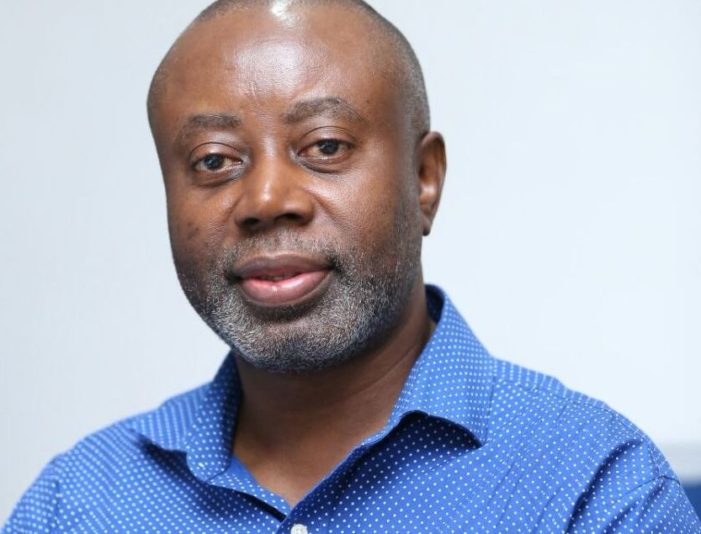
Dr Chido Onumah, one of the editors of the book
In a nutshell, this book comes away as a challenge to journalists and publishers in Nigeria. From Next234 to Premium Times, Dapsy’s trademark has remained investigative reporting. In these media organisations Dapsy raised the bar of journalism beyond ‘he said, he said’ to the height of critical reporting, which holds government accountable rather than massage the ego of those in power. Incidentally, Premium Times has infested the journalism body with this brand of reporting to the point that, today, many online and print platforms are emerging from the graves of dead publications across Nigeria. This is why Dapsy easily passes as the father of investigating reporting in modern Nigeria.
Dapo is a challenge to publishers, a challenge for them to reboot their journalism practice and keep their gaze on the ball, on the role of the Fourth Estate of the Realm in a democracy, which is to make political leaders accountable to the people. It is a tough assignment, but the life of Dapo proves that it is possible. The book was launched on Monday, May 27, 2019 at Yar’adua Centre in Abuja by the crème-dela-crème of the civil society and media industry in Nigeria.
This review was first published in Daily Trust on Saturday on June 8, 2019
The Insight Report
Nigeria Coverage

